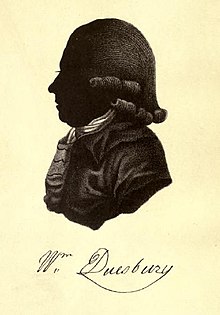William Duesbury
| William Duesbury | |
|---|---|

Silhouette of William Duesbury (18th century).
|
|
| Born |
William Duesbury 7 September 1725 Longton Hall, Staffordshire, England |
| Died | 30 October 1786 (aged 61) Derby |
| Nationality | English |
| Citizenship | British |
| Occupation | Fine porcelain manufacture |
| Spouse(s) | Sarah James |
| Children | William Duesbury II |
William Duesbury (1725–1786) was an important enameller and British entrepreneur, founder of the Royal Crown Derby and owner of porcelain factories at Bow, Chelsea, Derby and Longton Hall.
Duesbury was born on 7 September 1725. to William Duesbury, currier, of Cannock in Staffordshire.
Around 1742 he was working as an enameller in London, where he remained until 1753. Subsequently, between 1754-5, he lived and worked in Longton Hall, where his father lived and where there was a small china works.
On 1 January 1756 he moved with his father to Derby having acquired a share in the Derby potworks on Cockpit Hill with his new partners John Heath and Andrew Planche (1728–1805) a talented French Huguenot potter. Planche did not remain long in the partnership and left Derby. Duesbury with Heath's financial backing opened a new factory on the Nottingham Road. This new venture proved to be a success. A London agent was engaged in April 1757.
In 1770 Duesbury was able to purchase the failing Chelsea pottery factory and for the next few years he probably used it to decorate pottery produced in Derby destined for the London market. He continued the tradition at Chelsea of holding an annual auction. The first was on 17 April 1771 and the three following days, the next in 1773. In June 1774 he opened a warehouse in London at No. 1 Bedford Street, Covent Garden, and held periodical auctions of his wares at that address and stopped the Chelsea auctions. The ware was announced sometimes as Derby and Chelsea, and sometimes as Chelsea alone; and specimens of the various wares were on permanent view at the warehouse in Bedford Street, Covent Garden.
In March 1775 Duesbury and John Heath were given a Royal Warrant by George III appointing them "China Manufacturers in Ordinary to His Majesty". This allowed them to include a crown on their porcelain mark. The Duesbury "D" was now capped with a crown to record that they were "Derby China Manufacturers to His Majesty". Also in 1775 Duesbury acquired the manufactory of Bow and in 1777 those of Giles's manufactory, Kentish Town, and others.
...
Wikipedia
